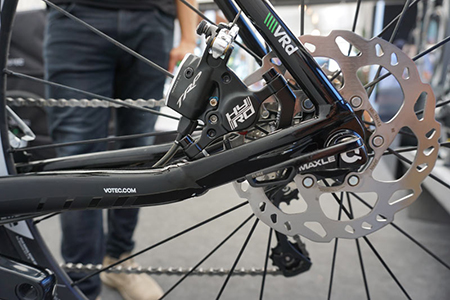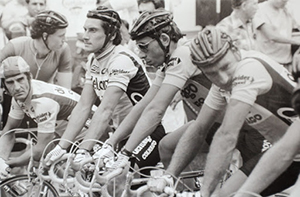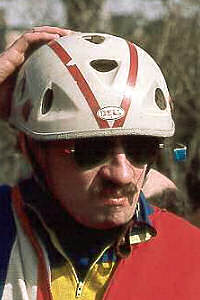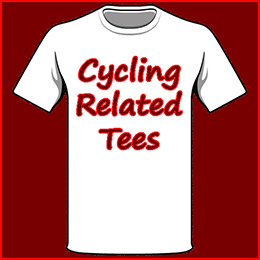The UCI Disc Brake Ban, and the American Market
 Mon, April 25, 2016
Mon, April 25, 2016 
The UCI (The World Governing Body for the sport of cycle racing.) recently lifted their ban on disc brakes for road racing and allowed them to be used in the Paris-Roubaix race.
Then when Movistar rider Francisco Ventoso suffered a severe cut on his leg, that may or may not have been caused by coming into contact with a disc brake, banned them again just as quickly.
By the way, this is just an observation, but:
Don’t manufacturers see that the fears the pros have might be a little less if the current crop of disc brakes didn’t look like a device for slicing meat. (See top picture.)
I’m sure someone will explain to me why the outside edge can’t be smooth and rounded, instead of resembling the teeth of a circular saw.
After the UCI ban, I read stories about the major bike manufacturers being in a panic, as in recent years they have all invested heavily in the development of disc brakes for road bikes.
Looking back at my own experience coming from Europe to America some 37 years ago, the industry has not a thing to worry about. As far as cycling is concered, the American leisure market drives itself, unaffected by what the European Pros are using.
Not only does the US leisure market drive itself it eventually influences what equipment the rest of the world uses, including the pros. Take helmet use as one prime example of this.
When I first came to the US in 1979, I came from a cycling culture where everyone who was seriously into the sport belonged to a local Cycling Club. Almost all club members raced at some level, either in road races or time-trials at the very least.
 No one used a helmet except for the leather hairnet kind (Right.) mandatory for amateur road races, but not time-trials.
No one used a helmet except for the leather hairnet kind (Right.) mandatory for amateur road races, but not time-trials.
Nowhere in the UK or the rest of Europe did cyclists wear helmets for leisure riding or training. In fact the idea was ridiculed.
Everyone had their bike set up like a pro, the club system saw to that. It helped coach and influence newcomers to the sport.
I arrived in the US to find no one had a clue what was going on in Europe, and neither did anyone care. Very few owners of racing bikes actually raced, and across the board everyone rode a frame that was 3 or 4 centimeters bigger than their European counterparts.
 Handlebars were up level with the saddle, and brake levers were high up on the bars with the levers sticking out like a pair of six-guns.
Handlebars were up level with the saddle, and brake levers were high up on the bars with the levers sticking out like a pair of six-guns.
And the helmets… Ugly white things that looked like an upturned pudding basin. And everyone had at least one story how their helmet had “Saved their Life.”
So the use of helmets is a prime example of how the American leisure market influenced the rest of the world. The UCI did not make helmets compulsory for the pros until as recent as 2003.
The Mountain Bike is another. Developed entirely in America, caught the imagination of all leisure cyclists and the general public, to the extent it killed the road bike market for a while. It created a huge market worldwide and got the corporations involved.
Index shifting too, brought about by the mountain bike and the large numbers of inexperienced riders it brought in. People who did not know how to shift gears with a friction shift. This then lead to gear levers up on the brake levers, and eventually 10 and 11 speed cassettes.
I am not suggesting these developments have been adverse, many have improved the sport. That is not my point. The technology was not developed in the pro peloton. In almost every sport, equipment is developed at the professional level, but not in cycling.
In fact the UCI bans the use of prototype equipment, thus stifling any useful technological advancement there. Disc brakes first appeared on mountain bikes, and have gradually made their way over to road bikes.
If the pros had more say in the development of disc brakes, their safety concerns would have already been addressed. But the UCI does everything ass backwards.
Meanwhile I don’t see why the big bike corporations are panicking (If indeed they are.) The American leisure rider doesn't give a damn what the UCI sanctions or what the European pros use. He never did, and never will. He is more influenced by what his buddies use on the next Sunday morning coffee ride.
 Dave Moulton | Comments Off |
Dave Moulton | Comments Off | 


















Reader Comments (12)
They are panicking because the French banned disc brakes in Gran Fondos as well as amateur races. If the rest of the world follows suit, the disc brake industry will go back to where it was before met bikes and cx bikes.
Discs on an off road bike make some sense, handle being wet and you have full suspension to you stiffen the fork without changing the ride.
Why I would want a stiffer fork and uneven forces on my road bike is beyond me.
The outer edge of the disc is serrated for both looks and to minimize warping, though it is tough to get a bike disc hot enough to matter.
Could part of the reason that the discs are 'toothed' be that this is a way of 'cutting weight' (or the perception of it)? I don't know what the reason is, and I'm just speculating about it.
As to the helmet vs. no helmet argument: lord knows if they actually help. I use one because I'm used to it. It also gives me a place to stick reflective tape and sometimes I mount a light on it, which comes in handy under certain conditions. I don't expect it to save me if I lose control at some of the higher speeds I ride at.
I've not seen a reason to consider disc brakes on my bikes yet, but I'm into classic and vintage steel bikes, and disc brakes would not work on them anyway. My rim brakes work fine, and I'm in no hurry to fix an issue that doesn't need fixing.
There was a relevant item about disc brakes on Velonews last weeK;
http://velonews.competitor.com/2016/04/bikes-and-tech/technical-faq/technical-faq-road-disc-brakes_402923
You would think that suppliers of disc brakes would start to make the discs smaller. The smaller the better, for road bikes. Smaller discs, larger pads.
Well, ya can't make discs too small, as physics and mechanical laws say they won't be effective.
The OD (circumferential) designs of discs are only cosmetic, not function. Same with cutouts in the disc, making them lighter and attractive.
The bike industry gave up feedback from pros long ago, at least Road. Not so MTB; the off-road industry lives or dies on feedback, and endorsement, from pros. Road gruppos and bikes are driven by the industry, not riders. The competition is fierce, and coming out with components that work better is on par with making them cheaper.
So it's a Catch-22. You get the good and the bad. Fast Fashion has a price, after all. To keep up, sometimes you make shit. No matter; for many corps, more money is allocated for advertising than the product itself!
I thought electronic shifting was available to pro teams a couple years before it was commercially available. Also I thought 10/11-speed drivetrains were prototyped professionally first.
What year did you move to the US? I would really like to know when people in the US started spreading FUD about helmets as "lifesavers". Probably the day a helmet was invented.
When I built a new touring bike in '14 for a self contained ride from Seattle to San Fran I decided to try out disk brakes for the first time. My previous tourer had linear pull brakes that worked great.The one before that had cantilevers which were pretty anemic. I have to say that I am really impressed with the stopping power of the disks. They easily controlled my 300lb rig (rider included) on 50+mph descents. I didn't particularly like the disks in the rain or even really humid days: they scream until they get hot enough to dry. It may have been in part my inexperience adjusting them. I would retrofit a front disk to my older tourer if I didn't have to replace the fork.
As for racing, my concern was that some bikes would have disks and others not. That could cause some interesting events heading into a slow corner: the disk bikes will come down much faster and be able to dive much deeper into a turn before braking than the side pull users.
Riders have been using disks in mountain bike racing since they first became available. I've never heard of any disk related injuries. I have lots of time in the dirt but never used disks. I understand that their ease of modulation makes them less likely to lock up a wheel and skid. Not as much of a problem on dry pavement anyway. I suspect the edge design is a nod to the shred mentality of the mtn bike community. By the way, my road disks have a smooth edge.
Over all I think disks are a good thing. I don't think there is any more danger of cutting yourself on the disk than putting your foot into the spokes and they sure do stop good. There will always be a way to make any good device dangerous: ask Mr. Nobel.
-Rob
If you had come ten years earlier you would have really been shocked. I think that until the early 1970's few people thought of bicycles as anything other than a balloon tired beast with a coaster brake. It was assumed that one was done with his bike when he started driving.
In 1970 I had never heard of Reynolds, derailleurs, sew-ups, professional racing, and the list goes on. It is amazing that in the next two years I acquired an obsession with bikes that has continued till now.
It was really hard to get the knowledge needed to enjoy the bike. The misinformation given as knowledge was incredible.
It still takes a weary eye to separate the marketing hype from real knowledge. We love a machine that is steeped in both engineering and superstition.
The first bike I actually went anywhere on and the one that kicked off my love of the beast was a Rudge Club Racer with a 3-speed hub and mustache bar (c1940s I think). It was my uncle's first full sized bike as a kid. It had spent way too many years left in the rain or parked at the beach.
I bought a road bike last year with hydraulic disc brakes. Now I have two road bikes, one with disc brakes and one with rim brakes.
The disc brakes do take some getting used to and the bike handles differently under braking. I find that reducing my tire pressure with the disc brakes to 90 psi from 110psi helpful with grip. I am yet to try tubeless but I can see a big benefit with disc brakes.
The real benefit is in the superb modulation of the brakes, much more control with less pressure on the brake lever, One fingered braking up on the hoods, no problems.
The discs don't get overly hot and the pads have lasted over twelve months (a few thousand miles), they are still going strong and I live in the hills!
I now get frightened in the wet with rim brakes or should I say lack of brakes.
It doesn't matter to me if the pro peletol adopt disc brakes or not, although a ban on sportives would be annoying for me, pile ups are not a big issue on sportives so I can't see the issue.
My experience is that disc brakes have made me quicker on decents, I brake later and feel more in control of the bike.
I would not force anyone to convert, but I for one am a big fan.